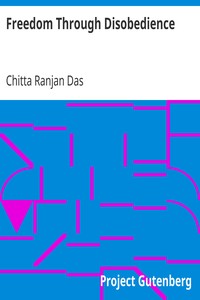Freedom Through Disobedience by Chitta Ranjan Das
"Freedom Through Disobedience" by Chitta Ranjan Das is a political speech delivered during the early 20th century, specifically in the 1920s, at the thirty-seventh session of the Indian National Congress. The book reflects on the theme of political resistance, urging the necessity of disobedience against unjust laws and repressive governmental practices as a means to achieve India's freedom from colonial rule. Das articulates the principles of nationalism, the importance of self-determination, and
the moral imperative of non-violent resistance. In this powerful address, Das draws parallels between historical struggles for freedom, including references to seminal events in English history, to argue that the Indian populace must assert their rights through disobedience to oppressive laws rather than passive compliance. He underscores the idea that true representation and governance must arise from the people's will and that unjust laws losing legitimacy through popular non-cooperation. Throughout, he emphasizes the need for a collective national identity and cooperation among various communities in India, promoting a vision of Swaraj (self-rule) that is rooted in the spiritual and moral upliftment of society. With a call for robust participation from all sections of the population, especially labor and peasant groups, Das seeks to unify diverse communities across India in the pursuit of freedom. (This is an automatically generated summary.)
Read or download for free
| How to read | Url | Size | |||
|---|---|---|---|---|---|
| Read now! | https://www.gutenberg.org/ebooks/35349.html.images | 139 kB | |||
| EPUB3 (E-readers incl. Send-to-Kindle) | https://www.gutenberg.org/ebooks/35349.epub3.images | 211 kB | |||
| EPUB (older E-readers) | https://www.gutenberg.org/ebooks/35349.epub.images | 212 kB | |||
| EPUB (no images, older E-readers) | https://www.gutenberg.org/ebooks/35349.epub.noimages | 106 kB | |||
| Kindle | https://www.gutenberg.org/ebooks/35349.kf8.images | 321 kB | |||
| older Kindles | https://www.gutenberg.org/ebooks/35349.kindle.images | 310 kB | |||
| Plain Text UTF-8 | https://www.gutenberg.org/ebooks/35349.txt.utf-8 | 125 kB | |||
| Download HTML (zip) | https://www.gutenberg.org/cache/epub/35349/pg35349-h.zip | 250 kB | |||
| There may be more files related to this item. | |||||
Similar Books
About this eBook
| Author | Das, Chitta Ranjan, 1870-1925 |
|---|---|
| Title | Freedom Through Disobedience |
| Credits | E-text prepared by Bryan Ness and the Online Distributed Proofreading Team (www.pgdp.net) from page images generously made available by Internet Archive (www.archive.org) |
| Reading Level | Reading ease score: 56.9 (10th to 12th grade). Somewhat difficult to read. |
| Language | English |
| LoC Class | DS: History: General and Eastern Hemisphere: Asia |
| Subject | India -- Politics and government -- 1919-1947 |
| Subject | Civil disobedience -- India |
| Category | Text |
| EBook-No. | 35349 |
| Release Date | Feb 21, 2011 |
| Copyright Status | Public domain in the USA. |
| Downloads | 406 downloads in the last 30 days. |
| Project Gutenberg eBooks are always free! | |

